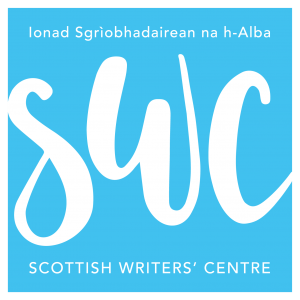In a packed CCA clubroom, the Scottish Writers’ Centre partnered with the nEW wRITINGS sHOWCASE for a night of readings and performance pieces. Familiar faces and talented newcomers alike shared their works, engaging with an array of themes and forms.
An introductory reading from the SWC’s own Derek Parkes, on the subject of learning to learn, paved the way for the evening’s first writers and poets. First up was Ann MacKinnon, whose poetry intimately intertwined history and death. ‘The Dead Poet’, a poem inspired by Philip Larkin, explored the anchoring of personal lives in objects, pictures, and screens, framing them as spaces where memories can echo. This focus on the interactions of history and death continued with the second speaker, Phil Thomas, whose poem, ‘Grand Designs’, melded historical narratives with a humorous treatment on what can happen when our presence extends from beyond the grave.

Next was Mark Haw, whose ‘The River’ examined the micro and macro aspects of remembrance among people and nature. The atomisation of the everyday in this poem progressed it to an increasing existential uncertainty, framed in an almost folktale form. This concern with being was also tackled in the readings from the next speaker, Elaine Gallagher. Her work joyed in the cultivation of an identity, of modelling oneself on figures of nature, taking root and growing. Her readings examined the dissonance experienced on the fringes of a crowd, and the joy felt in a group created as a space for oneself.

The quality of performances remained high as the evening went on; Cailean McBride read an extract set in 1974 Monaco, in which he used flowing dialogue to explore the themes of work, sexism, and limitation in one’s career. This was followed by a selection of readings by Colette O’Connor, whose hybrid poetry took a humorous look at invasions of boundaries and interruptions of gaze. Her poem ‘Medusa’ seemed to revel in overturning preconceived notions of desire; a powerful feminism rooted in anatomical metaphor and images of ostensible monstrosity. From here the night’s themes broadened, as Jill Korn read a story of realisations and empowerment. Her work focused on a sixty-year-old woman caught in an age of technocracy and alienation as she struggles to locate the sources of her stress.
After a short break, the room reconvened with a reading by Rachel Tennant, who led the audience with a performance on denied expectations and new perceptions of the body. Her works stretched from the beginnings of one’s life to the end: ‘XX’ confronted chromosomes and their connotations, being born female with no head for maths, contrary to parents’ expectations, while ‘Hometown Return’ mused on the prospect of having a place to come back to, a place for nature to reclaim the senses and the body.

The talent showcased did not diminish as Elissa Soave read a humorous piece which experimented with the comedic capabilities of the unreliable narrator. Exploring the force and farce of perceived common ground, Soave’s story unfolded the consequences of a one-sided authorial admiration gone too far, wittily tying together isolation and idolisation. This sense of estrangement and desire to be seen continued with the next reader, Sean Wai Keung, whose performance pieces and poems explored his experiences of race, heritage, and otherness. His performances critiqued reductive notions of food as a cultural gateway, and provided a powerful challenge to stereotypes of mixed heritage.
Next, Gabe Cohen read an extract from a novel which hybridised elements of science fiction and fantasy in a genre she christened ‘pixie-punk’. Her piece used the object of the embryonic or stasis-inducing tank as a means of alienating oneself from the body, treating it as a foreign object or environment over which controls that should be reflex must be consciously regained. This extra attention to the body intensified the strangeness of the artificial additions and often invasive technological instruments with which much science fiction is fascinated. Chris Powici followed, reading a series of poems which examined the ways in which interactions between human and nature can be used to greater effect. ‘A Noise Among Trees’ created the pathetic fallacy of the whispering river before expertly deconstructing it, lending it new significance, while ‘April’ seamlessly interwove romantic imagery with a mournful elegy.

This powerful examination of the affecting potential of form and content continued with Mary Irvine’s performance. The featured extract from her short story ‘Conflict’ was inspired by a cemetery in Bosnia and Herzegovina. Its presentation of a collective mourning for the death of the young spread carefully and touchingly through its subject matter as it travelled through a landscape of guilt, grief, escape, and loss. This contrasted well with the lighter subjects of the evening’s final scheduled speaker, Laura Tansley, whose poems were dedicated to her love of hand-drawn maps. Poems like ‘One’, ‘Two’, and ‘AA Maps and Batteries’ explored the concrete reliability of paper against the changeable, even ableist offerings of Google Maps. Her works underlined a love of routes and connections, and an appreciation for the group effort required when undertaking a more liberating, paper-led mode of travel.
At 9pm, when Tansley had concluded, the clubroom clearly wanted more. The evening ended with a reserve reading by Maria Sledmere, whose poems ‘I underline this for the sake of applying a hyperlink’ and ‘I dreamt I wrote copy for a cereal company’ deftly dissected the monotony of office work. These stream of consciousness poems evoked an almost dreamlike glide along the surface of the office space and its related activity, a glide which belay the poems’ deconstructions of this space as they drew on the most micro material details to pick away at the despondency of office culture and its service to a thankless economy.

The consistent quality on show at the event was a testament not only to the insight of the organisers, but to Scotland’s readily apparent creative talent. Each writer brought a significant voice to the evening, contributing to a collection whose level of literary achievement was clear to all who attended. Providing new opportunities for established and emerging writers, the nEW wRITINGS sHOWCASE continues to promote creative writing at its best.
Words by Alastair Millar
Photos by Rachel Walker



